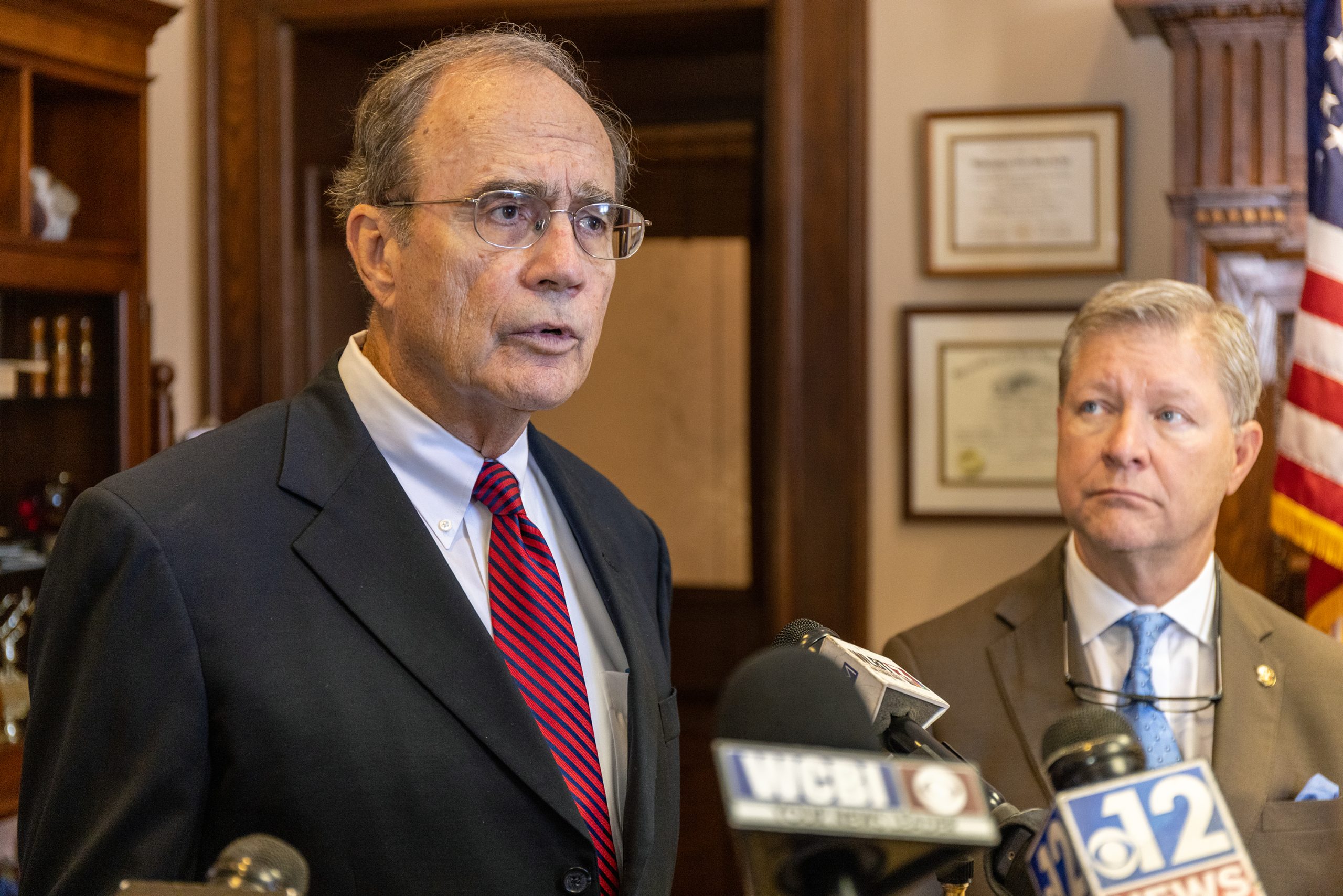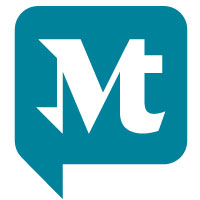Mississippi Today
Session 2023: Hosemann proposes tax refund checks up to $500, increased ed spending, health care fixes
Session 2023: Hosemann proposes tax refund checks up to $500, increased ed spending, health care fixes
Lt. Gov. Delbert Hosemann wants to send taxpayers rebate checks up to $500, increase education spending and push year-’round schooling and pre-K, and find fixes for the state’s health care crisis “not just for next year, but for the next generation.”
Some of his policy priorities for the 2023 legislative session that starts Jan. 3 already put Hosemann and the Senate he oversees at odds with his fellow Republican leaders in the House. For starters, House Speaker Philip Gunn and other GOP leaders said recently they want to eliminate the state income tax, not give one-time rebate checks. House and Senate Republican majorities are also expected to spar over extending postpartum Medicaid coverage for working mothers, which Hosemann and Senate leaders continue to support after it failed in the House last session.
READ MORE: Phase out income tax or cut taxpayers checks? GOP lawmakers, governor disagree
“We did the largest tax cut ever last year, close to $500 million in income taxes cut,” Hosemann said. “We have an excess of $270 million this year from our estimate of taxes we’ve collected. We propose to send it back.”
Hosemann said his proposal will be to refund taxpayers “dollar-for-dollar” what they paid in state income taxes for the past year “from the bottom up, until we run out of money.” He said initial estimates are that refund checks would be capped at about $500.
Republicans Gov. Tate Reeves and Gunn still want to phase out the personal income tax, as a follow-on to the massive income tax cuts passed last year, which are still being implemented. They say this will give the state an advantage with economic development.
Hosemann and Senate leaders say the national and state economies are in turbulent, inflationary times with recession possible, and that much of the state surplus is from unprecedented federal spending that isn’t likely to continue or recur. They warn that fully eliminating the income tax in such uncertain economic times is foolhardy, and that the state’s current windfall should be viewed as one-time money and given back to taxpayers as a one-time check.
Hosemann said he has been meeting with hospital and other health care officials across the state, including Greenwood Leflore Hospital, which he called the “canary in the mine” of the financial crisis facing the state’s hospitals, particularly in rural areas. Hosemann said he foresees the state providing some temporary financial aid and increased Medicaid reimbursement to struggling hospitals, but said he wants to find more permanent, structural fixes.
Hosemann said Mississippi’s health care infrastructure may have to change — particularly given population loss in the Delta and other areas. He said rural hospitals may have to shift to basic and emergency services, with more specialized care becoming centralized.
“I don’t want mommas having babies in the back of a car,” Hosemann said. “I think everyone should be within 30 minutes of care. But for that scheduled heart surgery, you may have to go to a larger hospital for it.”
Hosemann is one of few Republican leaders open to discussion of Medicaid expansion — pushed by many health care advocates and hospitals — but he said politically it’s not likely lawmakers will tackle that issue this year, and he said it’s not a cure-all.
“I don’t think that’s the answer,” Hosemann said. “Even if we had that expansion, (Greenwood Leflore) would not make it, it would still be short.”
Hosemann noted that the Senate has passed extension of postpartum Medicaid coverage for working mothers three times, with the House killing it. He said he expects the Senate to make the push to extend coverage from 60 days to a year again, as a way of helping the state address highest in the nation rates of infant and maternal mortality. He said a new study from Texas extending the coverage has shown numerous positive results.
In recent Senate hearings, numerous experts told lawmakers that Mississippi can spend about $7 million a year to keep mothers and newborns healthier, or continue to spend tens of millions more dealing with the fallout of having theworst infant and maternal mortality and morbidityin the country.
READ MORE: Extending postpartum coverage to Mississippi mothers ‘a no brainer,’ key lawmaker says
Hosemann said he has recently visited several school districts across the state, including in Corinth, Gulfport and Lamar County, that have started using a “modified calendar,” often referred to as year-around schooling. He said such schedules are already showing positive results here and nationwide, and he wants the state to provide incentives to districts that want to participate.
“We don’t need to just keep doing things the way they’ve always been done,” Hosemann said. He said the schedules of roughly nine weeks in school, two-to-three weeks off have been well received by parents and teachers. He said that for Lamar County, it cost about $200,000 to change the calendar and “that will be our measure to incentivize this with state grants for districts that want to do it.”
Hosemann said he wants to increase funding for pre-K public education. The Legislature has increased funding for early learning collaboratives to $16 million, funding about 30 programs across the state, plus another $20 million for other public pre-K programs, Hosemann said. But the state is still serving only about 6,000 of 20,000 eligible kids. Hosemann said he would like to increase that number to about 10,000 students in the coming year.
Recently House Education Chairman Richard Bennett, R-Long Beach, said he also would like to expand pre-K in the coming session. He noted that the state should not only provide more money for the programs, but provide schools with capital funding to build facilities for pre-K classes.
Hosemann also said he wants to increase funding in the coming year for the Mississippi Adequate Education Program. MAEP is the state’s school funding formula passed into law by the Legislature 25 years ago, but almost never fully funded, usually falling short hundreds of millions of dollars a year. Hosemann said Wednesday he wants to increase funding for MAEP, but declined to give an amount. He said it would likely still fall short of full funding, but “will be enough to make you smile.”
But Gunn recently said he was not for putting more money into MAEP. In the past, Gunn has unsuccessfully pushed to scrap the formula, which he said is flawed and continually calls for more money for schools that lawmakers can come up with. He called it “unattainable,” and has instead pushed for money going outside the formula to school programs lawmakers support rather than a formula that allows schools and districts autonomy on spending.
Hosemann said the state Legislature and federal government have pumped historic amounts of money into infrastructure in the last couple of years, and he plans to continue. He said the state will likely use remaining federal pandemic stimulus money to provide more matching water and sewerage money to cities and counties as it did last year. He said he also wants to provide another $100 million for the state’s Emergency Road and Bridge Program as it did last year. The state had recently faced closure of hundreds of roads and bridges, particularly in rural areas, due to lack of maintenance, but Hosemann said the state is well along in addressing the problem.
Hosemann said the state this year let about $963 million worth of road work contracts, “double what they normally would.”
Mississippi has seen huge budget windfalls since the federal government began pumping pandemic stimulus and infrastructure spending into the states. Hosemann said the state will have paid off about $600 million in debt during this time, increased its “rainy day fund” savings to about $700 million, and he proposes no state borrowing for the coming year.
“That means you don’t have to go out into the market to borrow at 6%-7%,” Hosemann said. “… We started a few years ago cutting our budget and getting things in order. We’re running Mississippi like a business and now we have the cash to address the issues we need to address.”
This article first appeared on Mississippi Today and is republished here under a Creative Commons license.
Did you miss our previous article…
https://www.biloxinewsevents.com/?p=201816
Mississippi Today
Hospitals see danger in Medicaid spending cuts
Mississippi hospitals could lose up to $1 billion over the next decade under the sweeping, multitrillion-dollar tax and policy bill President Donald Trump signed into law last week, according to leaders at the Mississippi Hospital Association.
The leaders say the cuts could force some already-struggling rural hospitals to reduce services or close their doors.
The law includes the largest reduction in federal health and social safety net programs in history. It passed 218-214, with all Democrats voting against the measure and all but five Republicans voting for it.
In the short term, these cuts will make health care less accessible to poor Mississippians by making the eligibility requirements for Medicaid insurance stiffer, likely increasing people’s medical debt.
In the long run, the cuts could lead to worsening chronic health conditions such as diabetes and obesity for which Mississippi already leads the nation, and making private insurance more expensive for many people, experts say.
“We’ve got about a billion dollars that are potentially hanging in the balance over the next 10 years,” Mississippi Hospital Association President Richard Roberson said Wednesday during a panel discussion at his organization’s headquarters.
“If folks were being honest, the entire system depends on those rural hospitals,” he said.
Mississippi’s uninsured population could increase by 160,000 people as a combined result of the new law and the expiration of Biden-era enhanced subsidies that made marketplace insurance affordable – and which Trump is not expected to renew – according to KFF, a health policy research group.
That could make things even worse for those who are left on the marketplace plans.
“Younger, healthier people are going to leave the risk pool, and that’s going to mean it’s more expensive to insure the patients that remain,” said Lucy Dagneau, senior director of state and local campaigns at the American Cancer Society.
Among the biggest changes facing Medicaid-eligible patients are stiffer eligibility requirements, including proof of work. The new law requires able-bodied adults ages 19 to 64 to work, do community service or attend an educational program at least 80 hours a month to qualify for, or keep, Medicaid coverage and federal food aid.
Opponents say qualified recipients could be stripped of benefits if they lose a job or fail to complete paperwork attesting to their time commitment.
Georgia became the case study for work requirements with a program called Pathways to Coverage, which was touted as a conservative alternative to Medicaid expansion.
Ironically, the 54-year-old mechanic chosen by Georgia Gov. Brian Kemp to be the face of the program got so fed up with the work requirements he went from praising the program on television to saying “I’m done with it” after his benefits were allegedly cancelled twice due to red tape.
Roberson sent several letters to Mississippi’s congressional members in weeks leading up to the final vote on the sweeping federal legislation, sounding the alarm on what it would mean for hospitals and patients.
Among Roberson’s chief concerns is a change in the mechanism called state directed payments, which allows states to beef up Medicaid reimbursement rates – typically the lowest among insurance payors. The new law will reduce those enhanced rates to nearly as low as the Medicare rate, costing the state at least $500 million and putting rural hospitals in a bind, Roberson told Mississippi Today.
That change will happen over 10 years starting in 2028. That, in conjunction with the new law’s one-time payment program called the Rural Health Care Fund, means if the next few years look normal, it doesn’t mean Mississippi is safe, stakeholders warn.
“We’re going to have a sort of deceiving situation in Mississippi where we look a little flush with cash with the rural fund and the state directed payments in 2027 and 2028, and then all of a sudden our state directed payments start going down and that fund ends and then we’re going to start dipping,” said Leah Rupp Smith, vice president for policy and advocacy at the Mississippi Hospital Association.

Even with that buffer time, immediate changes are on the horizon for health care in Mississippi because of fear and uncertainty around ever-changing rules.
“Hospitals can’t budget when we have these one-off programs that start and stop and the rules change – and there’s a cost to administering a program like this,” Smith said.
Since hospitals are major employers – and they also provide a sense of safety for incoming businesses – their closure, especially in rural areas, affects not just patients but local economies and communities.
U.S. Rep. Bennie Thompson is the only Democrat in Mississippi’s congressional delegation. He voted against the bill, while the state’s two Republican senators and three Republican House members voted for it. Thompson said in a statement that the new law does not bode well for the Delta, one of the poorest regions in the U.S.
“For my district, this means closed hospitals, nursing homes, families struggling to afford groceries, and educational opportunities deferred,” Thompson said. “Republicans’ priorities are very simple: tax cuts for (the) wealthy and nothing for the people who make this country work.”
While still colloquially referred to as the One Big Beautiful Bill Act, the name was changed by Democrats invoking a maneuver that has been used by lawmakers in both chambers to oppose a bill on principle.
“Democrats are forcing Republicans to delete their farcical bill name,” Senate Democratic Leader Charles Schumer of New York said in a statement. “Nothing about this bill is beautiful — it’s a betrayal to American families and it’s undeserving of such a stupid name.”
The law is expected to add at least $3.3 trillion to the nation’s debt over the next 10 years, according to the most recent estimate from the Congressional Budget Office.
This article first appeared on Mississippi Today and is republished here under a Creative Commons Attribution-NoDerivatives 4.0 International License.
The post Hospitals see danger in Medicaid spending cuts appeared first on mississippitoday.org
Note: The following A.I. based commentary is not part of the original article, reproduced above, but is offered in the hopes that it will promote greater media literacy and critical thinking, by making any potential bias more visible to the reader –Staff Editor.
Political Bias Rating: Center-Left
This article reports on the negative impacts of a major federal tax and policy bill on Medicaid funding and rural hospitals in Mississippi. While it presents factual details and statements from stakeholders, the tone and framing emphasize the harmful consequences for vulnerable populations and health care access, aligning with concerns typically raised by center-left perspectives. The article highlights opposition by Democrats and critiques the bill’s priorities, particularly its effect on poor and rural communities, suggesting sympathy toward social safety net preservation. However, it maintains mostly factual reporting without overt partisan language, resulting in a moderate center-left bias.
Crooked Letter Sports Podcast
Podcast: The Mississippi Sports Hall of Fame Class of ’25
The MSHOF will induct eight new members on Aug 2. Rick Cleveland has covered them all and he and son Tyler talk about what makes them all special.
Stream all episodes here.
This article first appeared on Mississippi Today and is republished here under a Creative Commons Attribution-NoDerivatives 4.0 International License.
The post Podcast: The Mississippi Sports Hall of Fame Class of '25 appeared first on mississippitoday.org
Mississippi Today
‘You’re not going to be able to do that anymore’: Jackson police chief visits food kitchen to discuss new public sleeping, panhandling laws
Diners turned watchful eyes to the stage as Jackson Police Chief Joseph Wade took to the podium. He visited Stewpot Community Services during its daily free lunch hour Thursday to discuss new state laws, which took effect two days earlier, targeting Mississippians experiencing homelessness.
“I understand that you are going through some hard times right now. That’s why I’m here,” Wade said to the crowd. “I felt it was important to come out here and speak with you directly.”
Wade laid out the three bills that passed earlier this year: House Bill 1197, the “Safe Solicitation Act,” HB 1200, the “Real Property Owners Protection Act” and HB 1203, a bill that prohibits camping on public property.
“Sleeping and laying in public places, you’re not going to be able to do that anymore,” he said. “There’s a law that has been passed that you can’t just set up encampments on public or private properties where it’s a public nuisance, it’s a problem.”
The “Real Property Owners Protection Act,” authored by Rep. Brent Powell, R-Brandon, is a bill that expedites the process of removing squatters. The “Safe Solicitation Act,” authored by Rep. Shanda Yates, I-Jackson, requires a permit for panhandling and allows people to be charged with a misdemeanor if they violate this law. The offense is punishable by a fine not to exceed $300 and an offender could face up to six months in jail. Wade said he’s currently working with his legal department to determine the best strategy for creating and issuing permits.
“We’re going to navigate these legal challenges, get some interpretations, not only from our legal department, but the Attorney General’s office to ensure that we are doing it legally and lawfully, because I understand that these are citizens,” he said. “I understand that they deserve to be treated with respect, and I understand that we are going to do this without violating their constitutional rights.”
Wade said the Jackson Police Department is steadily fielding reports of squatters in abandoned properties and the law change gives officers new power to remove them more quickly. The added challenge? Figuring out what to do with a person’s belongings.
“These people are carrying around what they own, but we are not a repository for all of their stuff,” he said. “So, when we make that arrest, we’ve got to have a strategic plan as to what we do with their stuff.”
Wade said there needs to be a deeper conversation around the issues that lead someone to becoming homeless.
“A lot of people that we’re running across that are homeless are also suffering from medical conditions, mental health issues, and they’re also suffering from drug addiction and substance abuse. We’ve got to have a strategic approach, but we also can’t log jam our jail down in Raymond,” Wade said.
He estimates that more than 800 people are currently incarcerated at the Raymond Detention Center, and any increase could strain the system as the laws continue to be enforced.
“I think there’s layers that we have to work through, there’s hurdles that we are going to overcome, but we’ve got to make sure that we do it and make sure that my team and JPD is consistent in how we enforce these laws,” Wade said.
Diners applauded Wade after he spoke, in between bites of fried chicken, salad, corn and 4th of July-themed packaged cakes. Wade offered to answer questions, but no one asked any.
Rev. Jill Buckley, executive director of Stewpot, said that the legislation is a good tool to address issues around homelessness and community needs. She doesn’t want to see people who are homeless be criminalized, but she also wants communities to be safe.
“I support people’s right to self determine, and we can’t impose our choices on other people, but there are some cases in which that impinges on community safety, and so to the extent that anyone who is camping or panhandling or squatting and is a danger to themselves and others, of course, I fully support that kind of law. I don’t support homelessness being criminalized as such,” Buckley said.

Many of the people Wade addressed while they ate Thursday said they have housing, don’t panhandle, and shouldn’t be directly impacted by the legislation. But Marcus Willis, 42, said it would make more sense if elected officials wanted to combat the negative impacts of homelessness that they help more people secure employment.
“There ain’t enough jobs,” said Willis, who was having lunch with his girlfriend Amber Ivy.
The two live in an apartment together nearby on Capitol Street, where Ivy landed after her mother, whom Ivy had been living with, suffered a stroke and lost the property. Similarly, Willis started coming to eat at Stewpot after his grandmother, whose house he used to visit for lunch, passed away.
Willis holds odd jobs – cutting grass, home and auto repair – so the income is inconsistent, and every opportunity for stable employment he said he’s found is outside of Jackson in the suburbs. The couple doesn’t have a car.
Making rent every month usually depends on their ability to find someone to help chip in, said Ivy, who is in recovery from substance abuse. She said she’s watched problems surrounding homelessness grow over the years in Jackson. Ivy grew up near Stewpot and has lived in various neighborhoods across the city – except for the times she moved out of state when things got too rough.
“There was just moments where I just had to leave,” Ivy said. “Sometimes if you hit a slump here, there’s almost no way for you to get out of it.”
This article first appeared on Mississippi Today and is republished here under a Creative Commons Attribution-NoDerivatives 4.0 International License.
The post 'You're not going to be able to do that anymore': Jackson police chief visits food kitchen to discuss new public sleeping, panhandling laws appeared first on mississippitoday.org
Note: The following A.I. based commentary is not part of the original article, reproduced above, but is offered in the hopes that it will promote greater media literacy and critical thinking, by making any potential bias more visible to the reader –Staff Editor.
Political Bias Rating: Center-Right
This article primarily reports on new laws in Jackson, Mississippi, targeting public sleeping, panhandling, and squatting, focusing on statements by Police Chief Joseph Wade and community perspectives. The coverage presents the legislative measures—authored by Republican and independent lawmakers—with a tone that emphasizes law enforcement challenges and community safety, reflecting a conservative approach to homelessness as a public order issue. While it includes voices concerned about criminalization and the need for social support, the overall framing centers on law enforcement and property protection. The article maintains factual reporting without overt editorializing but leans slightly toward a center-right perspective by highlighting legal enforcement as a solution.
-
News from the South - Georgia News Feed6 days ago
'Big Beautiful Bill' already felt at Georgia state parks | FOX 5 News
-
The Center Square7 days ago
Alcohol limits at odds in upcoming dietary guidelines | National
-
The Center Square5 days ago
Here are the violent criminals Judge Murphy tried to block from deportation | Massachusetts
-
News from the South - Texas News Feed6 days ago
Hill Country flooding: Here’s how to give and receive help
-
News from the South - North Carolina News Feed6 days ago
Raleigh caps Independence Day with fireworks show outside Lenovo Center
-
News from the South - Kentucky News Feed4 days ago
Woman arrested in Morgantown McDonald’s parking lot
-
News from the South - Missouri News Feed6 days ago
Shannon County Sheriff alleges ‘orchestrated campaign of harassment and smear tactics,’ threats to life
-
Our Mississippi Home6 days ago
The Other Passionflower | Our Mississippi Home



















































